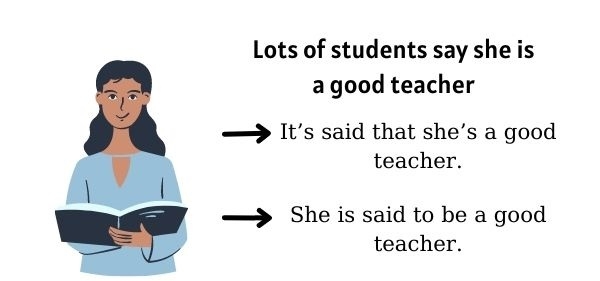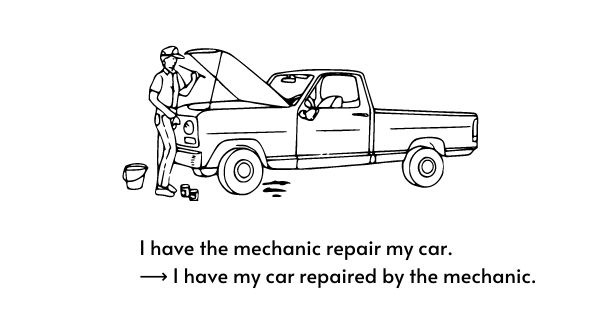Tailieumoi.vn sưu tầm và biên soạn bài tập Các dạng đặc biệt của câu bị động có đáp án, gồm 50 bài tập từ cơ bản đến nâng cao mong muốn giúp các em ôn luyện kiến thức đã được học về Các dạng đặc biệt của câu bị động hiệu quả. Mời các bạn đón xem:
Bài tập Các dạng đặc biệt của câu bị động
I. Các dạng đặc biệt của câu bị động (Passive Voice)
1. Câu bị động với 2 tân ngữ
Có nhiều trường hợp trong tiếng Anh động từ được theo sau bởi hai tân ngữ ở dạng : “V + Tân ngữ 1 + Tân ngữ 2.
Trong đó, tân ngữ 1 là tân ngữ gián tiếp, chỉ một người, sự vật hoặc sự việc mà chịu tác động không trực tiếp, có mối quan hệ không quá gần gũi với động từ chính.
Tân ngữ 2 là tân ngữ trực tiếp, tức là nó chịu tác động trực tiếp hoặc có liên quan mật thiết nhất với động từ chính trong câu.
Ví dụ: My father gave me a huge present. (Bố tôi tặng cho tôi một món quà lớn.)
|
My father |
gave |
me |
a huge present |
|
S |
V |
Oi |
Od |

Cách chuyển từ câu chủ động có hai tân ngữ sang passive voice đặc biệt
Các câu có dạng 2 tân ngữ này có thể được chuyển sang câu bị động đặc biệt (passive voice) theo hai cách khác nhau như sau:
TH1: Câu bị động đặc biệt chuyển tân ngữ gián tiếp (Oi) lên làm chủ ngữ chính trong câu:
S + be + VpII + Od
TH2: Câu bị động đặc biệt sử dụng tân ngữ trực tiếp (Od) lên làm chủ ngữ chính trong câu:
S + be + VpII + giới từ + Oi
Ví dụ:
My friend gave me an interesting book on my birthday. (Bạn tôi tặng tôi một quyển sách rất thú vị vào dịp sinh nhật.)
⟶ I was given an interesting book by my friend on my birthday.
⟶ An interesting book was given to me by my friend on my birthday.
The saleswoman is showing the clients the new house. (Nhân viên sale đang giới thiệu với khách hàng ngôi nhà mới.)
⟶ The clients are being shown the new house by the saleswoman.
⟶ The new house is being shown to the clients by the saleswoman.
2. Câu bị động với V + V-ing
Trong trường hợp theo sau động từ là một động từ dạng V-ing, khi chuyển sang câu bị động đặc biệt bạn có thể làm theo công thức sau:
|
Dạng chủ động: V + somebody + V-ing ⟶ Dạng bị động: V +somebody/something + being + VpII |
Động từ trong cấu trúc câu bị động đặc biệt là các từ như: love, like, dislike, enjoy, fancy, hate, imagine, admit, involve, deny, avoid, regret, mind….
Ví dụ:
I don’t like you watching TV all the time. (Mẹ không thích con xem TV cả ngày đâu.)
⟶ I don’t like TV being watched by you all the time.
3. Câu bị động với động từ tri giác
Với các động từ tri giác (verb of perception) như see, watch, notice, hear, look…, khi chuyển từ câu chủ động sang câu bị động đặc biệt các bạn có thể làm theo công thức sau:
|
Dạng chủ động: S + V + somebody + V-ing/to V-inf ⟶ Dạng bị động: S + to be + VpII + V-ing/to V-inf |
Ví dụ:
Somebody saw her leaving at midnight. (Ai đó đã nhìn thấy cô ấy rời đi lúc nửa đêm.)
⟶ She was seen leaving at midnight.
I heard them talk about the trip to Japan. (Tôi nghe thấy họ nói chuyện về chuyến đi đến Nhật Bản.)
⟶ They were heard to talk about the trip to Japan.
4. Câu bị động “kép”
Trường hợp động từ chính (V1) trong câu chủ động được chia ở các thì như thì hiện tại đơn, thì hiện tại tiếp diễn và thì hiện tại hoàn thành.
Một số động từ thường gặp trong câu bị động đặc biệt gồm say, think, expect, know, believe, understand, consider, find, ….
Dạng chủ động: S + V1 + that + S2 + V2 + ….
Dạng bị động:
TH1: It is + V1-pII + that + S2 + V2 + …
TH2: S2 + is/am/are + V1-pII + to + V2 (nguyên thể) +…
(chỉ dùng khi V2 ở thì hiện tại đơn hoặc tương lai đơn)
TH3: S2 + is/am/are + V1-pII + to have + V2-pII + …
(chỉ dùng khi V2 ở thì quá khứ đơn hoặc hiện tại hoàn thành)
Ví dụ:
Lots of students say she is a good teacher. (Nhiều học sinh nói rằng cô ấy là một giáo viên tốt.)
⟶ It’s said that she’s a good teacher.
⟶ She is said to be a good teacher.
People believe that their manager is very rich. (Mọi người tin rằng quản lý của họ rất giàu.)
→ It is believed that their manager is very rich.
→ Their manager is thought to be very rich.

Ví dụ về câu bị động đặc biệt có hai động từ chính và phụ
Trường hợp động từ chính (V1) trong câu được chia ở các thì như thì quá khứ đơn, quá khứ tiếp diễn, quá khứ hoàn thành.
Dạng chủ động: S + V1 + that + S2 + V2 + …
Dạng bị động:
TH1: It was + V1-pII + that + S2 + V2 + …
TH2: S2 + was/were + V1-pII + to + V2 (nguyên thể) + …
(chỉ dùng khi V2 được chia ở dạng thì quá khứ đơn)
TH3: S2 + was/were + V1-pII + to + have + V2-pII + …
Ví dụ:
People said that the new president was very polite. (Mọi người nói rằng tổng thống mới rất lịch sự.)
→ It was said that the new president was very polite.
→ The new president was said to be very polite.
It is believed that what she said was true. (Mọi người tin rằng những gì cô ấy nói là sự thật.)
→ She was believed to tell the truth.
→ What she said was believed to be true.
5. Bị động với câu mệnh lệnh
Với các câu mệnh lệnh bắt đầu bằng “It’s”, câu bị động đặc biệt của chúng sẽ có dạng:
|
It’s one’s duty to + V-inf ⟶ S + to be + supposed to+ V inf |
Ví dụ:
It’s your duty to wash dishes and take out the garbage today. (Nhiệm vụ của bạn là phải rửa bát và vứt rác hôm nay.)
⟶ You are supposed to wash dishes and take out the garbage today.
|
It’s necessary to + V-inf ⟶ S + should/ must + be + VpII |
Ví dụ:
It’s necessary to address the environmental problems in the next conference. (Việc giải quyết các vấn đề về môi trường trong cuộc họp tiếp theo là rất cần thiết)
⟶ The environmental problems should be addressed in the next conference.
|
Câu mệnh lệnh thức ⟶ S + should/ must + be + VpII |
Ví dụ:
Turn off the heater, please! (Làm ơn hãy tắt máy sưởi đi!)
⟶ The heater should be turned off.
6. Câu bị động với cấu trúc “Nhờ ai làm gì”
Câu bị động đặc biệt với nghĩa “Nhờ ai làm gì” thường xuất hiện hai động từ “have” và “get”.
|
Với động từ Have: S + have + somebody + V ⟶ S + have + something + VpII Với động từ Get: S + get + somebody + to-V ⟶ S + get + something + VpII |
Ví dụ:
I have the mechanic repair my car. (Thợ sửa xe sửa ô tô cho tôi.)
⟶ I have my car repaired by the mechanic.
I get the hairdresser to dye my hair. (Thợ làm tóc nhuộm tóc cho tôi.)
⟶ I get my hair dyed by the hairdresser.

Have và Get là hai động từ đi với cấu trúc câu bị động đặc biệt mang nghĩa là nhờ ai đó làm gì
7. Câu bị động với Make/Let
Động từ theo sau hai từ “make” và “let” đều ở dạng nguyên thể. Vậy khi chuyển sang câu bị động đặc biệt ta phải làm như thế nào?
|
Với động từ Make: S + make + sb + V-inf ⟶ S + be + made + to + V-inf Với động từ Let: S + let + sb + V-inf ⟶ Let + sb/st + be VpII / be allowed to V-inf |
Ví dụ:
My parents make me do all the housework. (Cha mẹ tôi bắt tôi làm tất cả công việc nhà.)
⟶ I am made to do all the housework.
My parents never let me watch TV more than 1 hour. (Bố mẹ không bao giờ cho tôi xem TV quá 1 tiếng đồng hồ.)
⟶ I am never let to watch TV more than 1 hour.
⟶ I am never allowed to watch TV more than 1 hour.
8. Câu bị động với 7 động từ đặc biệt
7 động từ bao gồm: suggest/require/request/order/demand/insist/recommend. Cấu trúc bị động đặc biệt với các động từ này như sau:
|
S + suggest/require/request/… + that + Clause (S + (should) + V -inf + O) ⟶ It + to be + VpII (of 7 verbs) + that + something + to be + VpII |
Ví dụ:
People suggested that the children should take part in outdoor activities. (Mọi người đề xuất rằng trẻ em nên tham gia vào các hoạt động ngoài trời.)
⟶ It was suggested that outdoor activities should be taken part in by children.
⟶ It was suggested that the outdoor activities to be taken part in by children.

Một số câu có những động từ như suggest, require, … có cách thành lập câu bị động đặc biệt riêng biệt
9. Câu bị động với chủ ngữ giả It
Với những câu có chủ ngữ là “It” dạng bị động đặc biệt của nó sẽ như sau:
|
It + to be + adj + for somebody + to V + to do something ⟶ It + to be + adj + for something + to be done. |
Ví dụ:
It is impossible for us to release the new album by next Wednesday. (Việc tung ra album mới vào thứ tư tuần tới là một điều không thể với chúng tôi.)
⟶ It is impossible for the new album to be released by next Wednesday.
II. Bài tập Các dạng đặc biệt của câu bị động
Bài 1. Viết lại các câu sau sử dụng cấu trúc câu bị động
1. We don't speak French in this store.
→ …………………………………………………………..
2. Anna asked her teacher a question.
→ …………………………………………………………..
3. Someone built the house two months ago.
→ …………………………………………………………..
4. I give her a huge present.
→ …………………………………………………………..
5. Marry will take care of him.
→ …………………………………………………………..
6. The waiter brought John a big bowl of salad.
→ …………………………………………………………..
7. Someone broke into our house last Sunday.
→ …………………………………………………………..
8. My classmate told the class a joke.
→ …………………………………………………………..
9. We will meet Donald at the train station.
→ …………………………………………………………..
10. Mike has not sent me the letters.
→ …………………………………………………………..
Đáp án:
1. French is not spoken in this store.
2. The teacher was asked a question by Anna.
3. The house was built 2 months ago.
4. She is given a huge present.
5. He will be taken care of by Marry.
6. A big bowl of salad was brought to John.
7. Our house was broken into last Sunday.
8. The class were told a joke by our classmate.
9. Donald will be met at the train station.
10. I have not been sent the letters by Mike.
Bài 2. Viết lại các câu sau sao cho nghĩa không đổi
1. People know that he is an excellent tennis player.
→ ………………………………………………………………….
2. They say that Mark is in hospital.
→ ………………………………………………………………….
3. They think that the kids go to bed early.
→ ………………………………………………………………….
4. People believe that the robbers have worked in the bank for a long time.
→ ………………………………………………………………….
5. They think that nuclear power stations are dangerous.
→ ………………………………………………………………….
6. Her colleagues thought that she went abroad.
→ ………………………………………………………………….
7. People know that private vehicles pollute the air.
→ ………………………………………………………………….
8. The consumers suppose that the new product will come out soon.
→ ………………………………………………………………….
Đáp án:
1. He is known to be an excellent tennis player.
2. Mark is said to be in hospital.
3. The kids are thought to go to bed early.
4. The robbers are believed to have worked in the bank for a long time.
5. Nuclear power stations are thought to be dangerous.
6. She was thought to go abroad.
7. Private vehicles are known to pollute the air.
8. The new product is supposed to come out soon.
Bài 3. Hoàn thành các câu sau sử dụng cấu trúc câu bị động dạng đặc biệt với "get"
1. I don't understand why this room is always so dirty. It …………….. (clean) every day.
2. We usually ………………… (the living room/ redecorate) every three years.
3. Susan isn't making her own wedding dress, she …………….. (it / make) by a designer in New York.
4. When foreign novels are translated into English, a lot of the original meaning usually ………………. (lose) in the translation.
5. She didn't fix his motorbike himself, she ………………….. (it / fix) at the garage.
6. If my motorbike ………………. (damage) by you, you will have to pay for the repairs.
7. Mark Thompson ……………… (kill) in an car crash in the US in the 1950s.
8. I'm going to buy food online and I ……………… (the food / deliver) to my apartment.
9. If you can't see clearly, you should ………………… (your eyes / test)
10. Are they going to paint the wall themselves, or …………………….. (it / paint)?
11. Did you know that Harry ………………. (promote) to a management position at work! What a surprising news.
12. ……………….. (pay) for a job you enjoy doing must be the happiest thing in your life!
Đáp án:
1. gets cleaned
2. get the living room redecorated
3. is getting it made
4. gets lost
5. got it fixed
6. gets damaged
7. got killed
8. am going to get the food delivered
9. get your eyes tested
10. are they going to get it painted
11. got promoted
12. getting paid
Bài 4. Chuyển các câu sau sang dạng bị động (Dạng bị động có 2 tân ngữ)
1. He sent the girl a letter.
→ _________________________________
→ _________________________________
2. My parents bought me a new laptop for my graduation.
→ _________________________________
→ _________________________________
3. The doctor prescribed the patient a new medication.
→ _________________________________
→ _________________________________
4. They will pay you $500.
→ _________________________________
→ ________________________________
5. The company gave its employees bonuses.
→ _________________________________
→ _________________________________
6. The teacher assigned the students a challenging project.
→ _________________________________
→ _________________________________
7. The government offered the farmers financial assistance.
→ _________________________________
→ _________________________________
8. The manager handed the employees their performance reviews.
→ _________________________________
→ _________________________________
9. The teacher will announce the results of the competition to the students.
→ _________________________________
→ _________________________________
10. The chef prepared the guests a delicious three-course meal.
→ _________________________________
→ _________________________________
Đáp án:
1. A letter was sent to the girl by him.
The girl was sent a letter.
2. A new laptop was bought for me for my graduation by my parents.
I was bought a new laptop for my graduation by my parents.
3. A new medication was prescribed to the patient by the doctor.
The patient was prescribed a new medication by the doctor.
4. $500 will be paid to you by them.
You will be paid $500 by them.
5. Bonuses were given to the employees by the company.
The employees were given bonuses by the company.
6. A challenging project was assigned to the students by the teacher.
The students were assigned a challenging project by the teacher.
7. Financial assistance was offered to the farmers by the government.
The farmers were offered financial assistance by the government.
8. Performance reviews were handed to the employees by the manager.
The employees were handed performance reviews by the manager.
9. An announcement of the competition results will be made to the students by the teacher.
The results of the competition will be announced to the students by the teacher.
10. The guests were served a delicious three-course meal by the chef.
A delicious three-course meal was served to the guests by the chef.
Bài 5. Chuyển các câu sau sang dạng bị động (Dạng bị động tường thuật)
1. He said that he didn’t have any plans for the weekend.
→ _________________________________
2. They told us that the meeting had been rescheduled to next month.
→ _________________________________
3. The spokesperson said that the company would launch a new product soon.
→ _________________________________
4. She said that she might consider the job offer.
→ _________________________________
5. He told me that he had already finished his assignment.
→ _________________________________
6.They said that the soldiers surrendered to the enemy.
→ _________________________________
7. People know that the man put up with his wife too much.
→ _________________________________
Đáp án:
It was said by him that he didn’t have any plans for the weekend.
We were told by them that the meeting had been rescheduled to next month.
The company was said to launch a new product soon by the spokesperson.
She was said to consider the job offer.
It was told to me that he had already finished his assignment.
The soldiers were said to surrender to the enemy.
The man is known to put up with his wife too much.
III. Bài tập vận dụng Câu bị động đặc biệt
Bài 1: Change the active sentence into the passive. There are two answers for each question.
Peter gave a bottle of milk to Mary.
I lent Lisa a pencil.
They told the truth to her.
The boss offered the job to Tommy.
Sarah taught her students English.
I sent Johnny an email last night.
Jolie sold all the potatoes to her customers.
I asked David a question about the plan.
Đáp án:
A bottle of milk was given to Mary by Peter.
Bài 2: Change the sentences into passive voice with the structure “have/get something done”
I have the cleaner clean the room.
We get the mechanic to fix the brakes.
She has the teacher explain the lessons.
I have my husband look after the children.
They get the waiter to bring some wine.
He has the nurse take care of the patients.
I get the dentist to clean my teeth.
They have the window cleaner wash the windows.
The boss gets the secretary to type the report.
She has the shop deliver the food.
Đáp án:
I have the room cleaned.
We get the brakes fixed.
She has the lessons explained.
I have the children looked after by my husband.
They get some wine brought.
He has the patients taken care of.
I get my teeth cleaned.
They have the windows washed.
The boss gets the report typed.
She has the food delivered.
Bài 3: Rewrite these sentences with the passive voice
People think that the new government is a good speaker.
-> It is _______________________________________.
They report that the suspected robber is in the bank today.
-> The suspected _______________________________________.
People don’t expect that the new party will win the election.
-> It isn’t _______________________________________.
People know that smoking is dangerous.
-> It is _______________________________________.
They think that the children are playing in the room.
-> The children _______________________________________.
People say that she is talented at playing the piano.
-> She _______________________________________.
The newspaper reported that he won the lottery.
-> He _______________________________________.
They think that your cake is so delicious.
-> It is _______________________________________.
Đáp án:
It is thought that the new government is a good speaker.
The suspected robber is reported to be in the bank today.
It isn’t expected that the new party will win the election.
It is known that smoking is dangerous.
The children are thought to be playing in the room.
She is said to be talented at playing the piano.
He was reported to win the lottery.
It is thought that your cake is so delicious.
Bài 4: Change these sentences below into Passive Voice
They see her going out with someone.
I saw him feeding his dog.
We heard her singing loudly.
His mother didn’t let him use the car.
Our boss let us leave early.
The father made the children do the homework.
This film made me cry.
Her jokes often make me laugh.
Đáp án:
She is seen going out with someone.
He was seen feeding his dog.
She was heard singing loudly.
He wasn’t allowed to use the car by his mother.
We were allowed to leave early by our boss.
The children were made to do the homework by the father.
I was made to cry by this film.
I am often made to laugh by her jokes.
Bài 5: Change these sentences into Passive Voice
Shut the door!
Tell me the truth!
Serve the best dish!
Don’t speak a word here!
Clean your room!
Cut your hair!
Repair the car!
Learn your lesson by heart.
Turn off the TV!
Give me your money.
Đáp án:
Let the door be shut!
Let the truth be told to me!
Let the best dish be served!
Let a word not be spoken here!
Let your room be cleaned!
Let your hair be cut!
Let the car be repaired!
Let your lesson be learned by heart.
Let the TV be turned off!
Let your money be given to me.
Bài 6: Rewrite these sentences with the passive voice
I never hear her shout at her children.
They made me do it.
People know that he works very hard.
She prevented them from taking the medicine.
I have the doctor look after my baby.
People say that prevention is better than cure.
It’s necessary for us to protect our planet.
They owed me 10 dollars last week.
Đáp án:
She is never heard to shout at her children.
I was made to do it.
He is known to work very hard.
They were prevented from taking the medicine.
I have my baby looked after by the doctor.
It is said that prevention is better than cure.
It’s necessary for our planet to be protected.
I was owed 10 dollars last week.
Thanh Nguyễn
2024-07-02 09:17:23
ko đệp